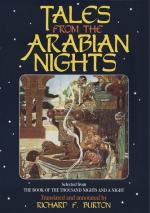[FN#245] “’Tis dogged as does it” was the equivalent expression of our British Aristotle; the late Charles Darwin.
[FN#246] Arab. “Jannat al-Khuld"=the Eternal Garden: vol. ix. 214.
[FN#247] [I read: Wa inni la-ar’akum wa ar’a widada-kum, wa-hakki-kumu antum a’azzu ’l-Wara ’andi=And I make much of you and of your love; by your rights (upon me, formula of swearing), you are to me the dearest of mankind.—St.]
[FN#248] In text: “He swam the stream and bestrode his she-camel.”
[FN#249] In text “Then she folded the letter and after sealing it,” etc.
[FN#250] Not “her hands” after Christian fashion.
[FN#251] In text, “Ahyaf,” alluding to Al-Hayfa.
[FN#252] Arab. “Al-Kawa’ib,” also P. N. of the river.
[FN#253] This is moralising with a witness, and all it means is “handsome is that handsome does.”
[FN#254] In text “’Arsh” = the Ninth Heaven; vol. v.167.
[FN#255] The Shi’ah doctrine is here somewhat exaggerated.
[FN#256] “Them” for “her,” as has often occurred.
[FN#257] In the original “entrusted to her the missive:” whereas the letter is delivered afterwards.
[FN#258] The cloud (which contains rain) is always typical of liberality and generous dealing.
[FN#259] The Koranic chapt. No. xx., revealed at Meccah and recounting the (apocryphal) history of Moses.
[FN#260] The “broken” (wall) to the North of the Ka’abah: Pilgrimage iii. 165.
[FN#261] i.e. “Delight of the Age:” see vol. ii. 81.
[FN#262] In the text written “Imriyyu ’l-Kays”: for this pre-Islamitic poet see Term. Essay, p. 223. “The Man of Al-Kays” or worshipper of the Priapus-idol was a marking figure in Arabian History. The word occurs, with those of Aera, Dusares (Theos Ares), Martabu, Allat and Manat in the Nabathaean (Arabian) epigraphs brought by Mr. Doughty from Arabia Deserta (vol. i. pp. 180-184).
[FN#263] In text “Zakka,” which means primarily a bird feeding her young.
[FN#264] In the text “months and years,” the latter seeming de trop.
[FN#265] Or “Yathrib” = Al-Madinah; vol. iv. 114.
[FN#266] Scott (vi. 358 et seqq.) who makes Ali bin Ibrahim, “a faithful eunuch,” renders the passage, “by some accident the eunuch’s turban unfortunately falling off; the precious stones (N.B. the lovers’ gift) which, with a summary of the adventures (!) of Eusuff and Aleefa, and his own embassy to Sind, were wrapped in the folds, tumbled upon the floor,”
[FN#267] i.e. “Drawer-out of Descriptions.”
[FN#268] i.e. a Refuser, a Forbidder.
[FN#269] i.e. both could not be seen at the same time.
[FN#270] [The Ms. has T Kh D H, which the translator reads “takhuz-hu.” I suspect that either the second or eighth form of “ahad” is meant, in the sense that thou comest to an agreement (Ittihad) with him.—St.]




